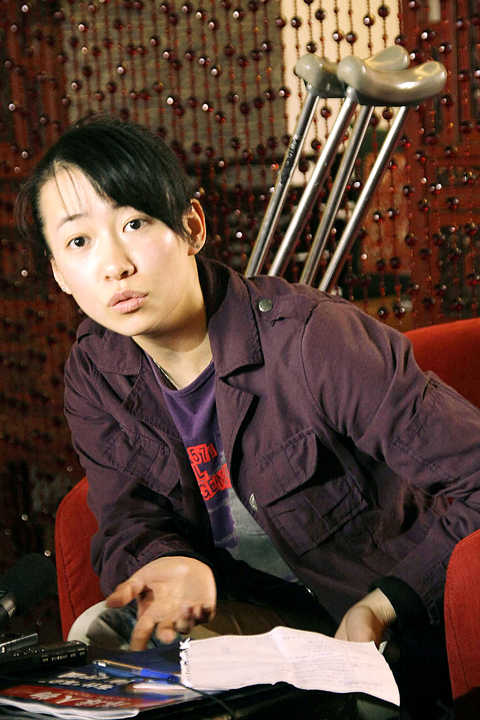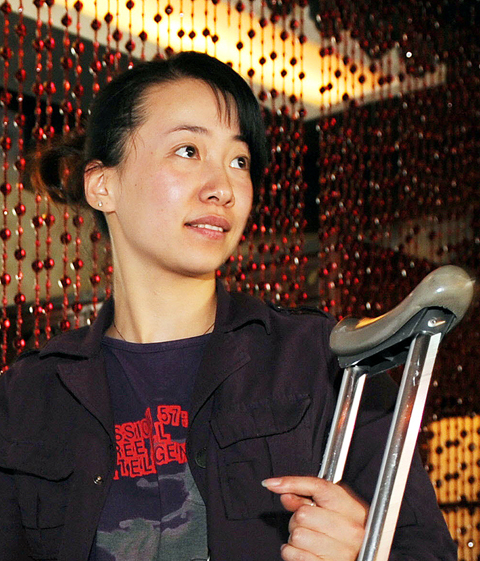She’s been portrayed as the “smiling angel in a wheelchair,’’ just the hero that China needed to rally national pride in the face of the embarrassment suffered over Olympic torch relay protests.
Jin Jing (金晶), a disabled, little-known fencing athlete, is now a household name here, riding a wave of sympathy and state media publicity after clinging stubbornly to the torch while a Tibet supporter tried to wrestle it away during the Olympic torch relay in Paris on April 7.
Ten days later, Jin seems overwhelmed by the publicity and said she still doesn’t understand why protesters wanted to take the torch. Until the incident in Paris, she said she had never heard that some Tibetans want independence from China.

PHOTO: AP
“I don’t pay attention to politics,’’ she said on Thursday in her first meeting with foreign reporters, a publicity agent from torch relay sponsor Lenovo Group by her side and whispering to her at least once about the Tibet-related questions.
Jin’s professed innocence is part of her appeal to Chinese, who have celebrated her ever since photos of her Paris struggle made the rounds online.
Disruptions of the torch relay in London, Paris and San Francisco shocked many Chinese, dimming a hoped-for moment of Olympic glory and inciting a fierce, besieged nationalism.

PHOTO: AFP
China has sought to use the Aug. 8 to Aug. 24 Olympics as a showcase to demonstrate it is an open, modern country. Protesters say China doesn’t deserve to host the Olympics because of its human rights record, its harsh rule in Tibet, and its friendly ties with Sudan.
Jin is now known as a defender of China’s dignity, embodying a national pride hurt by the protests that overwhelmed the torch relay and the criticisms of China’s crackdown in Tibet. While the first images of Jin on the Internet seemed to come from onlookers in Paris, state media soon began telling and retelling her story.
She joins a list of heroes promoted by the Communist government’s propaganda authorities, often at times of tension with the outside world. In 2001, after a US surveillance plane collided with a Chinese jet fighter off southern China, the Chinese pilot who died in the crash became a national hero. The Pentagon said the pilot’s reckless flying caused the crash.
While Jin is being praised, angrier Chinese have taken to seeking revenge. Users of the Internet, where a virulent nationalism thrives, have targeted those perceived as enemies with “human flesh search engines’’ — online campaigns that incite acts that are committed off-line.
This week, a Chinese student at Duke University was singled out for trying to negotiate peace between pro-Tibet and pro-China protesters on her campus.
Her photograph was taken at the face-off, the day the torch relay passed through San Francisco, and soon posted on a Web forum for Chinese students. The forum termed her a “traitor to your country’’ and gave her name, Chinese identification number and home address in China.
A photo posted online this week showed what was said to be a bucket of feces dumped on her parents’ doorstep in the port city of Qingdao.
The “human flesh search engine’’ also went after the man who tried to take the torch, mistakenly accusing a 44-year-old Tibetan living in Utah.
With his name, address, phone number and even a map of his neighborhood posted on some Chinese Web sites, Lobsang Gendun received so much harassment by phone and online that he moved into a hotel.
“I told them, ‘You’ve got the wrong person,’’’ said Gendun, a soft-spoken father of two.
Meanwhile, a lingering sense of insult over the confrontation in Paris has led to an online movement to boycott the French retail chain Carrefour. And the Chinese Foreign Ministry has joined critics of CNN, demanding that the network apologize for a commentator’s remarks that Chinese leaders were “thugs’’ and its products “junk.’’
In recent days, many Chinese users on MSN chat boards have attached heart icons with the word “CHINA’’ next to their profile names.
One analyst played down the impact of the impassioned rhetoric, which has been fanned by China’s government-controlled media. “The government loves that — allow it to dissipate online where it’s completely harmless,’’ said Paul French, chief China analyst for market intelligence provider Access Asia. “When it takes place on the street, I’ll be interested.’’
Jin previously was a member of Shanghai’s wheelchair fencing team who attracted little attention. The 28-year-old Paralympian’s right leg had been amputated when she was a child because of a malignant tumor.
The constant spotlight has been overwhelming, said spokespeople for Lenovo, the Chinese computer manufacturer that is a torch relay sponsor and chose Jin to participate in the relay. The Paralympics will be held in Beijing on Sept. 6 to Sept. 17, following the Olympics.
Jin left Thursday’s news conference on crutches, quickly.
During the 20-minute appearance, Jin avoided politics, although it dominated the reporters’ questions. Why was she attacked? She said she still does not know: “I hope you in the media can answer that for me.’’
She repeated the Chinese government’s position on the issue — “Tibet has always been a part of China’’ — and when asked if she had considered the Tibetans’ point of view, the Lenovo minder sitting next to her whispered sharply.
“Everyone has their own point of view,’’ Jin said. But she added, addressing the protesters, “Your actions are wrong.’’
The torch incident in Paris apparently hasn’t dampened Jin’s enthusiasm. A Lenovo spokeswoman said talks are under way about the possibility of the fencer carrying the Olympic torch again, this time when it comes through Shanghai.
When asked if she had a dream, Jin had a simple answer. “World peace,’’ she said with a smile.

June 9 to June 15 A photo of two men riding trendy high-wheel Penny-Farthing bicycles past a Qing Dynasty gate aptly captures the essence of Taipei in 1897 — a newly colonized city on the cusp of great change. The Japanese began making significant modifications to the cityscape in 1899, tearing down Qing-era structures, widening boulevards and installing Western-style infrastructure and buildings. The photographer, Minosuke Imamura, only spent a year in Taiwan as a cartographer for the governor-general’s office, but he left behind a treasure trove of 130 images showing life at the onset of Japanese rule, spanning July 1897 to

In an interview posted online by United Daily News (UDN) on May 26, current Chinese Nationalist Party (KMT) Chairman Eric Chu (朱立倫) was asked about Taichung Mayor Lu Shiow-yen (盧秀燕) replacing him as party chair. Though not yet officially running, by the customs of Taiwan politics, Lu has been signalling she is both running for party chair and to be the party’s 2028 presidential candidate. She told an international media outlet that she was considering a run. She also gave a speech in Keelung on national priorities and foreign affairs. For details, see the May 23 edition of this column,

The Taiwan People’s Party (TPP) on May 18 held a rally in Taichung to mark the anniversary of President William Lai’s (賴清德) inauguration on May 20. The title of the rally could be loosely translated to “May 18 recall fraudulent goods” (518退貨ㄌㄨㄚˋ!). Unlike in English, where the terms are the same, “recall” (退貨) in this context refers to product recalls due to damaged, defective or fraudulent merchandise, not the political recalls (罷免) currently dominating the headlines. I attended the rally to determine if the impression was correct that the TPP under party Chairman Huang Kuo-Chang (黃國昌) had little of a

At Computex 2025, Nvidia CEO Jensen Huang (黃仁勳) urged the government to subsidize AI. “All schools in Taiwan must integrate AI into their curricula,” he declared. A few months earlier, he said, “If I were a student today, I’d immediately start using tools like ChatGPT, Gemini Pro and Grok to learn, write and accelerate my thinking.” Huang sees the AI-bullet train leaving the station. And as one of its drivers, he’s worried about youth not getting on board — bad for their careers, and bad for his workforce. As a semiconductor supply-chain powerhouse and AI hub wannabe, Taiwan is seeing